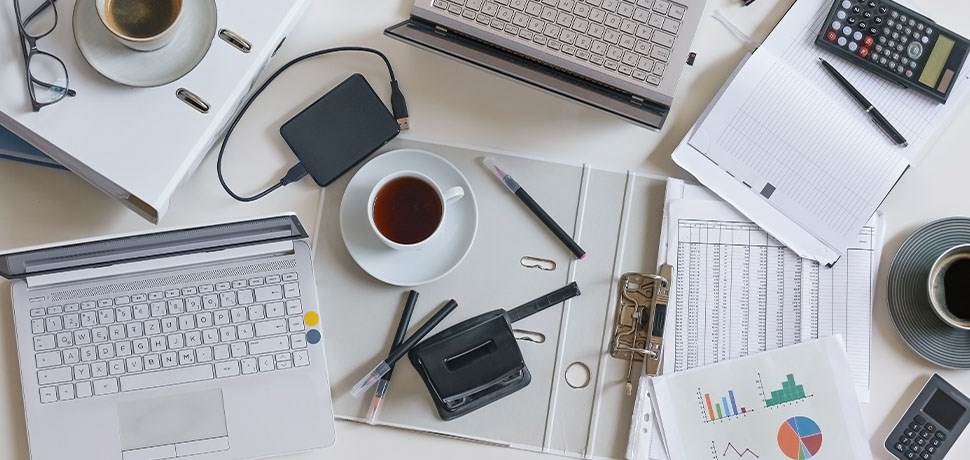October is Mental Health Awareness Month, and at Sasfin, we emphasise the significance of mental well-being in the workplace, particularly in managing the stress and anxiety arising from balancing work, family, and financial pressures. Mental health is not just a personal matter; it profoundly impacts how we engage in our professional lives.
According to the Second Annual Mental State of the World Report 2021 from Sapien Labs, South Africa is among the countries most negatively affected by mental health challenges. At least a quarter of South African employees will be diagnosed with depression during their employment journey. Furthermore, it is estimated that employee absenteeism due to depression costs the South African economy R19 billion annually—an astounding figure.
To better understand how daily stresses impact our mental health, let’s imagine our mental well-being as a desk—a place where we keep everything that matters.
At the start of the workday, our desk is organised. Pens are in their holders, papers are neatly stacked, and there’s room to breathe. We feel in control. However, as the demands of work, home life, financial pressures, and personal expectations increase, things begin to change. Someone asks for something urgently, and we rummage through drawers, scattering pens and papers. If you’re working from home, your child may come in, disrupting your flow, and suddenly a mug tips over, spilling coffee all over the desk. Slowly, the pressures we juggle pile up until the desk becomes overloaded. The legs wobble, and eventually, after too many items have been placed on it, the entire structure collapses.
For many of us, this is what stress and mental strain feel like. We start out feeling strong, but as the pressures of daily life—be it work, family, financial, or personal—build up, our mental ‘desk’ becomes cluttered, chaotic, and increasingly difficult to manage. This often leads to stress and anxiety, which can negatively affect both our physical and mental well-being if not managed properly.
Just as with a cluttered desk, managing stress and anxiety requires regular upkeep, attention, and the right tools.
5 Tips to Manage Stress and Anxiety
- Practice Mindfulness
Mindfulness acts like a reset button. Whether through meditation, deep breathing, or simply taking a walk without distractions, being present can help reduce anxiety and bring clarity.
- Schedule Breaks
Constant pressure can lead to burnout. Take regular breaks throughout the day, even if it’s just five minutes to stretch, enjoy a coffee, or step outside. A refreshed mind is a more productive mind.
- Move Every Day
Physical activity has been shown to improve mental health and relieve stress and anxiety. Find an activity you enjoy to make it easier to commit to movement. If all you have is ten minutes, use that time to go for a walk or do a short yoga routine.
- Reach Out
You don’t have to manage your mental load alone. Talk to friends, family, or a professional if things feel overwhelming. Having someone to confide in can make a world of difference.
- Designate a Work-Only Zone
Working from home can make maintaining a work-life balance more challenging. The inability to switch off often leads to stress and anxiety. To create a boundary between work and personal life, designate a work-only zone in your home. At the end of the workday, shut down and clear away signs of work before physically stepping away. Doing something simple, like going for a walk or making a cup of tea, can help signal the end of your working day and allow you space to focus on yourself and your family.
How is Your Desk Looking?
Remember, mental health is an ongoing process, much like maintaining an organised desk. This October, take the opportunity to check in with yourself, clear the clutter, and prioritise your well-being in both your personal and professional life.
It’s essential to ask yourself: how is your desk looking? Is it clear and functional, or is it overloaded and teetering under the weight of too many responsibilities? More importantly, what steps are you taking to prevent it from collapsing?
Sometimes, the solution is to reorganise—clear the clutter, discard what’s no longer useful, and make space for what matters most. Other times, it’s about building a stronger desk—one with sturdier legs, a well-placed lamp, and perhaps even a few locked drawers where we can safely store the things we need but don’t want to overwhelm us.
Mental Health Awareness Month is a reminder that it’s okay not to have everything perfectly together all the time. What’s crucial is recognising when we need help and making use of the resources available. After all, a sturdy desk is the foundation for doing our best work—at home, in the office, and everywhere in between.






